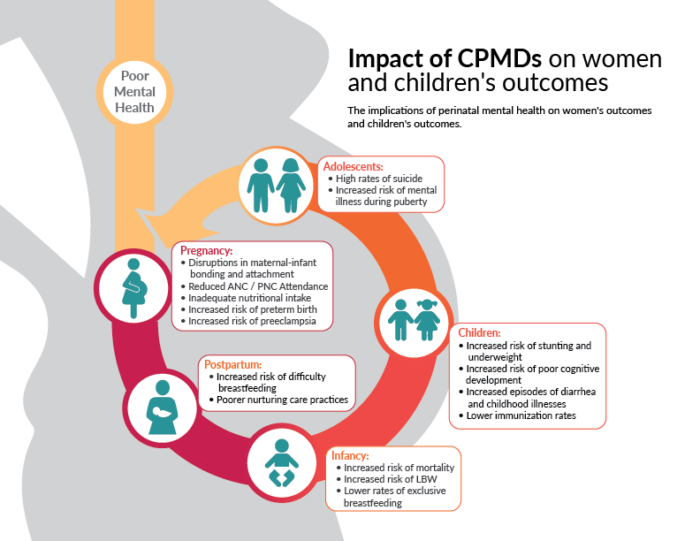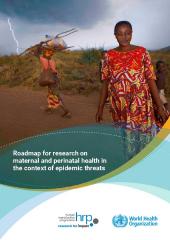Perinatal mental health (PMH) concerns the mental health of people during pregnancy and the first year after giving birth. Common perinatal mental disorders (CPMDs), such as depression, anxiety, and somatic disorders, pose significant and lasting implications for women’s health and quality of life, as well as newborn health and development, with intergenerational impacts. As highlighted in this foundational landscape analysis on maternal mental health, the perinatal period is associated with elevated risk of mental disorders and is a critical time to identify and address mental health concerns. The impact of mental health disorders during the perinatal period deeply affects women, their children, and their families.

Landscape Analysis
The landscape analysis found that risk factors for perinatal mental disorders in low- and middle-income countries (LMICs) range from broader social determinants of health and gender inequality to individual experiences, such as a history of stillbirth or mistreatment by health care providers. Vulnerable groups—adolescents, women experiencing gender-based violence, women living in humanitarian settings, women with a history of obstetric trauma, or those living in poverty—have additional unique perinatal mental health needs.
This analysis also outlines key evidence and gaps related to maternal mental health, promising implementation practices and strategies, and measurement considerations. Cost-effective and feasible interventions for mental conditions, with demonstrated effectiveness for CPMDs, exist and can be implemented today). The merging of maternal, newborn, child, and adolescent health and mental health communities provides a seminal opportunity to accelerate research, learning, and action to address maternal mental health.
Global PMH Theory of Change and Research Agenda
This global PMH Theory of Change offers a common framework that can guide global PMH thinking, investments, and programming to improve countries’ progress towards widely accessible, high-quality provision of PMH care services. The co-creation of these guiding documents was a critical step in fostering a global community working collaboratively towards a shared vision of better PMH globally. The co-creation resulted in a prioritized set of research questions from which the global PMH community can work from to help fill in the evidence gaps for implementation.
Key Resources
-
Report
Roadmap for research on maternal and perinatal health in the context of epidemic threats
-
Guidance
A Shared Vision for Improving Perinatal Mental Health in Low- and Middle-Income Countries: A Theory of Change and Prioritized Implementation Research Questions
-
Briefs & Fact Sheets
Collaborating for Maternal Mental Wellbeing: Technical Brief on Perinatal Mental Health in Humanitarian Settings
-
Journal Series
The Lancet Perinatal Mental Health Series
-
Briefs & Fact Sheets, Journal Article
The Silent Burden: Understanding Perinatal Mental Disorders in Low- and Middle-Income Countries
-
Guidance
Comprehensive Mental Health Action Plan


